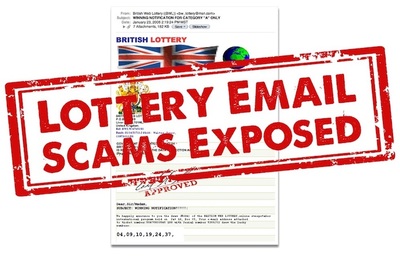Email Lottery Scams
Whenever a new technology takes off with consumers, it is always just a matter of time before someone figures out how to use it to take advantage of others. While online and email scams are nothing new, the use of lottery prizes and sweepstakes as the bait is becoming more common. In 2017, American and Canadian consumers reported a total of $117 million in losses due to lottery fraud, with email being one of the methods of disseminating this scam. In this article, we’ll explain what the email phishing lottery scam is, what it looks like, and how to avoid it.
What is Email Phishing?

What Do Email Phishing Lottery Scams Look Like?
When phishing emails are sent as part of a lottery scam, the fraudsters typically pose as an international organization claiming that the recipient has been entered into a draw and has won. The emails will impersonate an official-sounding agency, such as the “Global Trust Agency” or the “Government Promotions Office.” Since these lotteries don’t exist, there is no way that the email recipient could have ever entered whatever contest they have allegedly won. The scammers will ask for personal information, such as the target’s name, address, and bank account, or other financial information such as their PayPal or Venmo account.
Another version of the email lottery scam is advance-fee fraud. In this version, the targets are told that they have won a large prize but that they must send a transfer fee or processing charge to receive the reward. This is a more direct way for scammers to get money from their victims.
How to Avoid Lottery Scams
The best way to avoid falling for the email phishing lottery scam is to learn the typical signs of fraud. It is also helpful to be suspicious of any messages you receive from addresses not in your contacts list. The first thing you should do if you receive a suspicious email is to look at the sender’s address. Scammers will often use free sites, like Gmail or Yahoo, to create their account. No legitimate lottery organization would use a free email provider to correspond with winners.
Next, ask yourself if you entered any lottery contests lately. No matter what falsehoods the scammers use to convince you that your name was selected, remember that you cannot win a prize for a game that you didn’t enter. If they say a company entered the lottery on your behalf, don’t believe them. Nothing in life is free, and that includes the lottery.
It is also helpful to use some common sense. If the email uses a salutation like "Dear winner" instead of your name, consider it suspicious. If the text of the message is full of typos or faulty grammar, read it with caution because no reputable company would ever send out such low-quality correspondence. Most importantly, if they are claiming to be an official organization, do a quick search about them online.
Above all, if you don’t want to fall victim to an email phishing lottery scam, then never give out your personal information online. Unless you know without a doubt that the person on the other end of the computer is who they actually say they are, do not give away your information.
Conclusion
Email phishing is one of the most common online scams, and sweepstakes or lottery prizes are an enticing lure. Protect yourself from these and other lottery scams by approaching messages from unknown senders with caution, and look for the signs of fraud discussed above.






